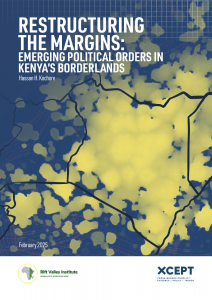During the past decade, northern Kenya’s peripheral border counties have become key to the central state’s political and economic agenda. This synthesis report therefore uses the concept of ‘restructuring the margins’ to unpack the findings of two case study reports exploring how political decentralization, coupled with cross-border, national level and county-level dynamics, impact borderland trade and conflict. The sites for the respective case studies are Moyale town, which straddles the Kenya–Ethiopia border, and Mandera town, sited at a point where the Kenya–Ethiopia–Somalia borders meet. Comparing these two sites reveals significant differences in how cross-border programmes and national policies are implemented on the ground.
- In Moyale, strategies aimed at stimulating and formalizing trade through infrastructure development and revenue extraction have led to the increased presence of national government institutions. Although trade formalization using the recently opened one stop border post (OSBP) has facilitated growing revenues—at least for the national government, though not for the county authorities—small-scale traders have largely been excluded, causing them to turn to informal routes.
- In Mandera, meanwhile, the Kenyan government’s enforcement of the official border closure has only ever been partial at best. Despite national government officials describing local cross-border trade as ‘informal’ and a ‘local arrangement’, it has grown considerably over recent years. Placing the findings from Mandera alongside those from Moyale underlined the point that dichotomies such as ‘formal and informal’ or ‘legal and illegal’ are misleading when it comes to understanding the dynamics of cross-border trade, and thus how best to programmatically support it.
- Taking a wider perspective, the report explores how the two border counties in which the case studies are sited have been affected by postcolonial state formation and collapse across the Horn of Africa, as well as recent structural changes in the Kenyan state. These processes have evolved during the past 30 years, with key moments such as Somalia’s state collapse and regime change in Ethiopia—both in 1991—as well as the start of Kenya’s devolution process in 2013, prompting a long-term reconfiguration of spatial and political dynamics.
- While Kenyan devolution allows for greater political agency and resource allocation at the local level, it also has important implications for conflict dynamics and centre–periphery relations in border areas such as Moyale and Mandera. Both cases demonstrate that inter-ethnic cooperation in politics and trade can not only help reduce conflict, but enable local elites to gain greater leverage vis-à-vis the national government.
- In addition to alliances among political elites, the case studies spotlight the experiences of—often marginalized, often female—small-scale traders in building multi-ethnic networks. These networks can help such traders remain in business in a region where conflict is prevalent and livelihoods precarious.
- Finally, the synthesis report calls on all relevant actors to: acknowledge the importance of informal cross-border trade; recognize and promote the peace- and state-building potential of informal small-scale cross-border traders; learn from and build on community-led, grassroots initiatives that create dialogue across ethnic boundaries and national borders; and communicate existing and emerging procedures relevant to small-scale and informal traders.
XCEPT PROGRAMME
This report is a product of the FCDO’s Cross-Border Conflict Evidence, Policy and Trends (XCEPT) programme, funded by UK aid from the UK government. XCEPT brings together leading local and international experts to examine conflict-affected borderlands, how conflicts connect across borders, and the factors that shape violent and peaceful behaviour. The programme carries out research to better understand the causes and impacts of conflict in border areas and their international dimensions. It supports more effective policymaking and development programming and builds the skills of local partners. The views expressed do not necessarily reflect the UK government’s official policies.




